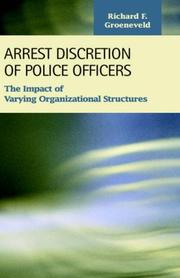| Listing 1 - 4 of 4 |
Sort by
|
Book
ISBN: 1621573990 9781621573999 Year: 1999 Publisher: Washington, District of Columbia : Regnery Publishing,
Abstract | Keywords | Export | Availability | Bookmark
 Loading...
Loading...Choose an application
- Reference Manager
- EndNote
- RefWorks (Direct export to RefWorks)
Every day, thousands of police officers willingly put their lives in danger to uphold their pledge to protect and serve the public. Once respected for their dedication and professionalism, police officers are now used as scapegoats--the victims of second guessing and racial issues. Allegations of excessive force and police brutality are rampant. Cases involving cops are more political, more scrutinized, and more explosive than ever before. Written in the years following the aftermath of the infamous Rodney King trial, Cops Under Fire is veteran Associated Press writer Larry McShane's probe into a series of high-profile cases involving police officers whose actions in the line of duty led to the questioning of their motives and ruining of their reputations.
Police-community relations --- Police shootings --- Police discretion --- Police and the press --- Police --- Public opinion
Book
ISBN: 1280487682 9786613582911 1594392447 Year: 2012 Publisher: Wolfeboro, New Hampshire : YMAA Publication Center, Inc.,
Abstract | Keywords | Export | Availability | Bookmark
 Loading...
Loading...Choose an application
- Reference Manager
- EndNote
- RefWorks (Direct export to RefWorks)
In a free and peaceful society where so many have been taught that all violence is wrong, citizens are often confused and dismayed when officers use force, even when the force is perfectly lawful and justified. This book explains how police are taught to make decisions on the use of force. Readers will understand how to behave when confronted by a police officer and how the police officer interprets the situation.
Police discretion --- Police training --- Arrest (Police methods) --- Self-defense (Law) --- Restraint of prisoners --- Justifiable homicide --- Violence (Law) --- Necessity (Law) --- Tort liability of police --- Police misconduct --- Police-community relations

ISBN: 1593321813 9781593321819 9781593321253 1593321252 9781593323363 1593323360 Year: 2005 Publisher: New York LFB Scholarly Pub.
Abstract | Keywords | Export | Availability | Bookmark
 Loading...
Loading...Choose an application
- Reference Manager
- EndNote
- RefWorks (Direct export to RefWorks)
Police discretion --- Arrest (Police methods) --- Organizational behavior --- Police administration --- Police --- Organization --- Organizational research --- Cops --- Gendarmes --- Law enforcement officers --- Officers, Law enforcement --- Officers, Police --- Police forces --- Police officers --- Police service --- Policemen --- Policing --- Criminal justice, Administration of --- Criminal justice personnel --- Peace officers --- Public safety --- Security systems --- Arresting --- Decision making. --- Research. --- Legal status, laws, etc.
Book
ISBN: 159332636X 9781593326364 9781593324483 1593324480 Year: 2011 Publisher: El Paso LFB Scholarly Pub.
Abstract | Keywords | Export | Availability | Bookmark
 Loading...
Loading...Choose an application
- Reference Manager
- EndNote
- RefWorks (Direct export to RefWorks)
Kargin examines police officers' decision making with regard to peer reporting of unethical police behavior. On a theoretical level, a peer reporting model was developed based on Rest's (1984) "four component," Trevino's (1986) "a person-situation interactionist," and, finally, Jones' (1991) "issue-contingent" models of ethical decision making for investigation of police officers' peer reporting decisions. The results suggest that the perceived seriousness of the unethical behavior is the strongest predictor of police officers' peer reporting in minor and moderate policy violations. However, o
Police --- Peer review --- Police-community relations --- Police misconduct --- Police discretion --- Discretion, Police --- Administrative discretion --- Misconduct in office --- Public relations --- Peer evaluation --- Peer rating --- Review, Peer --- Professional employees --- 360-degree feedback (Rating of employees) --- Cops --- Gendarmes --- Law enforcement officers --- Officers, Law enforcement --- Officers, Police --- Police forces --- Police officers --- Police service --- Policemen --- Policing --- Criminal justice, Administration of --- Criminal justice personnel --- Peace officers --- Public safety --- Security systems --- Complaints against --- Rating of --- Legal status, laws, etc.
| Listing 1 - 4 of 4 |
Sort by
|

 Search
Search Feedback
Feedback About UniCat
About UniCat  Help
Help News
News